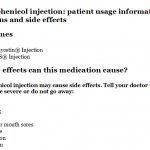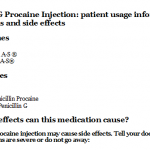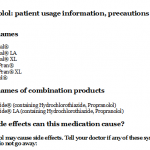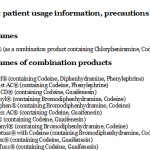
Vivotif (Typhoid Vaccine Live Oral Ty21a): patient information, prescribing information, ingredients, manufacturer, adverse reactions and side effects
Thursday, April 06, 2017 by Gregory Van Dyke
http://www.naturalnewsreference.com/2017-04-06-vivotif-typhoid-vaccine-live-oral-ty21a-patient-information-prescribing-information-ingredients-manufacturer-adverse-reactions-and-side-effects.html

HIGHLIGHTS OF PRESCRIBING INFORMATION
These highlights do not include all the information needed to use Vivotif safely and effectively. See full prescribing information for Vivotif.
See full insert sheet at this link at the Natural News Reference website.
Vivotif® Typhoid Vaccine Live Oral Ty21a
Live Attenuated Vaccine for Oral Administration Only
Initial US Approval:
INGREDIENTS AND EXCIPIENTS
Vivotif (Typhoid Vaccine Live Oral Ty21a) is a live attenuated vaccine for oral administration only. The vaccine contains the attenuated strain Salmonella typhi Ty21a (1,2). Vivotif is manufactured by the Crucell Switzerland LTD. The vaccine strain is grown in fermentors under controlled conditions in medium containing a digest of yeast extract, an acid digest of casein, dextrose and galactose. The bacteria are collected by centrifugation, mixed with a stabilizer containing sucrose, ascorbic acid and amino acids, and lyophilized. The lyophilized bacteria are mixed with lactose and magnesium stearate and filled into gelatin capsules which are coated with an organic solution to render them resistant to dissolution in stomach acid. The enteric-coated, salmon/white capsules are then packaged in 4-capsule blisters for distribution.
INDICATIONS AND USAGE
Vivotif (Typhoid Vaccine Live Oral Ty21a) is indicated for immunization of adults and children greater than 6 years of age against disease caused by Salmonella typhi. Routine typhoid vaccination is not recommended in the United States of America. Selective immunization against typhoid fever is recommended for the following groups: 1) travelers to areas in which there is a recognized risk of exposure to S. typhi, 2) persons with intimate exposure (e.g. household contact) to a S. typhi carrier, and 3) microbiology laboratorians who work frequently with S. typhi (7). There is no evidence to support the use of typhoid vaccine to control common source outbreaks, disease following natural disasters or in persons attending rural summer camps.
DOSAGE AND ADMINISTRATION
One capsule is to be swallowed approximately 1 hour before a meal with a cold or luke-warm [temperature not to exceed body temperature, e.g., 37 °C (98.6 °F)] drink on alternate days, e.g., days 1, 3, 5 and 7. Immunization (ingestion of all 4 doses of Vivotif (Typhoid Vaccine Live Oral Ty21a) should be completed at least 1 week prior to potential exposure to S. typhi.
Re-immunization
The optimum booster schedule for Vivotif has not been determined. Efficacy has been shown to persist for at least 5 years. Further, there is no experience with Vivotif as a booster in persons previously immunized with parenteral typhoid vaccine. It is recommended that a re-immunization dose consisting of 4 vaccine capsules taken on alternate days be given every 5 years under conditions of repeated or continued exposure to typhoid fever (7).
DOSAGE FORMS AND STRENGTHS
A single foil blister contains 4 doses of vaccine in a single package.
CONTRAINDICATIONS
Hypersensitivity to any component of the vaccine or the enteric-coated capsule. The vaccine should not be administered to persons during an acute febrile illness. Safety of the vaccine has not been demonstrated in persons deficient in their ability to mount a humoral or cell-mediated immune response, due to either a congenital or acquired immunodeficient state including treatment with immunosuppressive or antimitotic drugs. The vaccine should not be administered to these persons regardless of benefits.
WARNINGS AND PRECAUTIONS
Vivotif (Typhoid Vaccine Live Oral Ty21a) is not to be taken during an acute gastrointestinal illness. The vaccine should not be administered to individuals receiving sulfonamides and antibiotics since these agents may be active against the vaccine strain and prevent a sufficient degree of multiplication to occur in order to induce a protective immune response. Postpone taking the vaccine if persistent diarrhea or vomiting is occurring. Unless a complete immunization schedule is followed, an optimum immune response may not be achieved. Not all recipients of Vivotif will be fully protected against typhoid fever. Vaccinated individuals should continue to take personal precautions against exposure to typhoid organisms, i.e. travelers should take all necessary precautions to avoid contact or ingestion of potentially contaminated food or water.
Vivotif (Typhoid Vaccine Live Oral Ty21a) is not to be taken during an acute gastrointestinal illness. The vaccine should not be administered to individuals receiving sulfonamides and antibiotics since these agents may be active against the vaccine strain and prevent a sufficient degree of multiplication to occur in order to induce a protective immune response. Postpone taking the vaccine if persistent diarrhea or vomiting is occurring. Unless a complete immunization schedule is followed, an optimum immune response may not be achieved. Not all recipients of Vivotif will be fully protected against typhoid fever. Vaccinated individuals should continue to take personal precautions against exposure to typhoid organisms, i.e. travelers should take all necessary precautions to avoid contact or ingestion of potentially contaminated food or water.
ADVERSE REACTIONS
More than 1.4 million doses of Ty21a have been administered in controlled clinical trials and more than 150 million doses of Vivotif (Typhoid Vaccine Live Oral Ty21a) have been marketed world-wide. Active surveillance for adverse reactions of enteric-coated capsules was performed in a pilot study (21) and in a subgroup of a large field trial (14) involving a total of 483 individuals receiving 3 vaccine doses. The overall symptom rates from both studies when vaccinated with capsules were combined and shown to be:
abdominal pain (6.4%)
nausea (5.8%)
headache (4.8%)
fever (3.3%)
diarrhea (2.9%)
vomiting (1.5%)
skin rash (1.0%).
USE IN SPECIFIC POPULATIONS
Pregnancy
Pregnancy Category C: Animal reproduction studies have not been conducted with Vivotif. It is not known whether Vivotif can cause fetalharm when administered to pregnant women or can affect reproduction capacity. Vivotif should be given to a pregnant woman only if clearly needed.
Nursing Mothers
There is no data to warrant the use of this product in nursing mothers. It is not known if Vivotif is excreted in human milk.
Pediatric Use
The safety and efficacy of Vivotif has not been established in children under 6 years of age. This product is not indicated for use in children under 6 years of age.
Revised:
https://www.fda.gov/downloads/BiologicsBloodVaccines/Vaccines/ApprovedProducts/UCM142807.pdf
http://naturalnewsreference.com/vaccine-insert-sheets/Vivotif.pdf
Tagged Under: Tags: dosage, ingredients, insert sheet, side effects, usage, Vivotif, warnings





